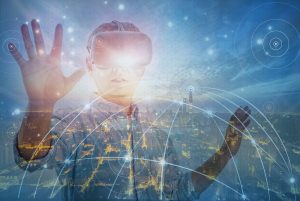
Virtual Reality (VR) has been defined as the “use of interactive simulations created with computer hardware and software to present users with opportunities to engage in environments that appear and feel similar to real-world objects and events” (Lam et al., 2006). The Horizon Report suggests that the growing affordability of VR enabling technologies is likely to lead to a broad adoption of VR in higher education in the next 2 to 3 years. Many pundits (i.e. prominent identities like Facebook’s Mark Zuckerberg) are spruiking the “promise of VR” for entertainment, communication and education. Others are urging caution. So, what is the low down on VR and its possible impact on higher education?
Virtual Reality in education is worth discussing for a number of reasons. First it is a re-emerging technology that is predicted to have a pervasive impact on society – we have already seen other pervasive technologies impact education. Second it is a technology that is evolving in tandem with new ideas about learning leading to the advent of intriguing possibilities and affordances for teaching and learning in higher education. Third, it is technology that has been touted as addressing concerns that are emerging in relation to the future of education – for example student attendance and engagement concerns that we share at ANU.
In this coffee course, we will take a closer look at VR and explore the affordances of this technology for higher education. In particular:
- The potential for immersive and visceral VR educational experiences (but what about the physiological and psychological effects of using the technology in its current form?)
- Is VR the re-birth of embodied cognition in higher learning?
- Where does VR fit in respect to learning theories?
- How is VR influencing what we know about learning and teaching?
We will wet our virtual taste buds on some VR applications that are currently being used for teaching and learning in higher education and consider the design principles that are shaping VR education experiences. And perhaps we will do a bit of imagining (in the digital realm) of the possible visions of the future of VR for teaching and learning and in particular the opportunities at the ANU.
Course Dates
This course ran from Monday, 17 July to Friday, 21 July 2017 , but is accessible online to anyone interested. There are 5 blog posts that will each take about 10-15 minutes to work through.
Course Topics
- Day 1 : A brief Introduction to Virtual Visualisation Technology
- Day 2: What constitutes a VR Experience? (Part 1)
- Day 3: What constitutes a VR Experience? (Part 2)
- Day 4: The effects of VR on Body and Mind: Empathy and Embodiment
- Day 5: VR and Education
Facilitators
Glen O’Grady is Director, Centre for Higher Education, Learning and Teaching (CHELT). His interests in VR relate to how VR is a tool for addressing philosophical, sociological and educational questions about learning in a social constructed reality. He is also fascinated by the question what would you do if you had a Star Trek holodeck in your lounge room?
Frederick Chew is Senior Educational Designer at the College of Arts and Social Sciences. Frederick is always interested in technologies that enhances learning. He wants to see how VR can be used to address issues faced in classroom, particularly equity in accessing learning.
Craig Gall is an Educational Technologist in the College of Arts and Social Sciences. With a background in computer games development he has a keen interest in the technologies and techniques used in game design and how these relate to teaching. He is excited for the future of VR, and is sure that much like the smartphone it will change the way we access information, entertainment and socialise.
Technology-Enhanced Learning in Higher Education Certificate
Go here to learn more on getting recognised for your participation in coffee courses (ANU Staff only).
All are welcome
We welcome all staff, including tutors, demonstrators, professional staff, and academics at the Australian National University to join us, as well as colleagues at other institutions.
Questions?
Please feel free to contact us at clt@anu.edu.au with any questions.
